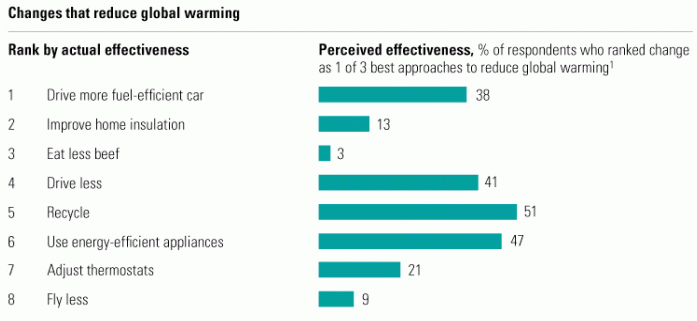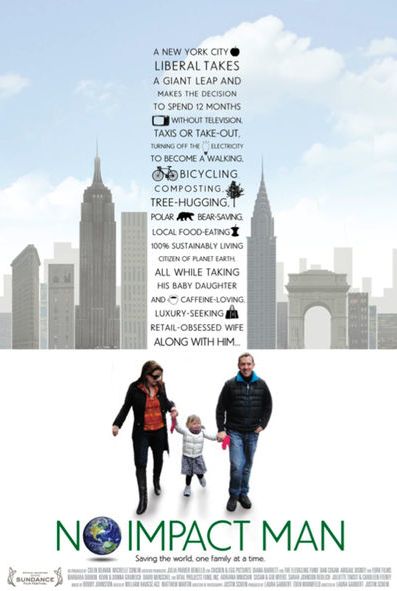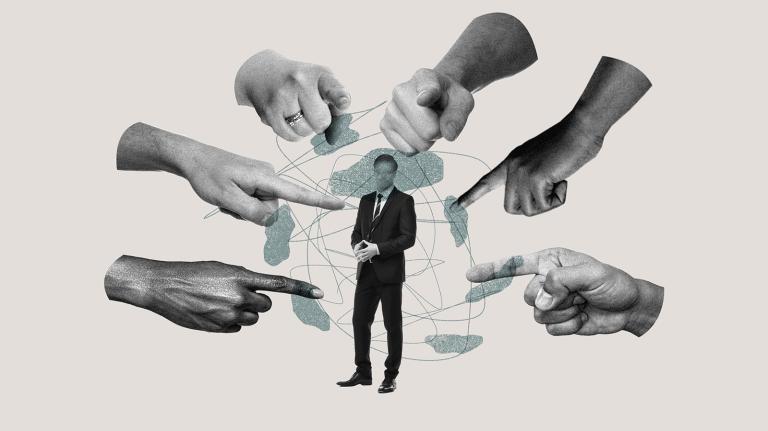The other day I highlighted a new piece from Elizabeth Kolbert in the New Yorker, which was critical of No Impact Man and other “stunts” in hyper-green living. Mainly I used it as an excuse to point to my old piece on the civic sphere, which, ahem, you should read.
I should have made it clear in the post that I have not read the No Impact Man book (or the other books mentioned in Kolbert’s piece), so I’m not really qualified to comment on whether her criticisms are fair.
Not surprisingly, Colin Beavan — No Impact Man himself — doesn’t think so! Kolbert’s main charge is that personal lifestyle changes like his, no matter how committed or extreme, tend to obscure the fact that the big changes needed are collective — social and political. One person changing doesn’t amount to much.
Beavan wrote me to protest that a) he agrees with Kolbert’s point entirely, b) his book actually contains a whole section toward the end about volunteering for NGOs and going to lobby Congress, and c) he has consistently used his platform to push for social action. One of Beavan’s supporters also mounts a convincing defense in this post. It does seem that, whatever you could say about the other books in Kolbert’s review, she did seem to squeeze Beavan into a box to make a point, a box in which he doesn’t really belong.
You could argue, I guess, that whatever Beavan’s intentions, and whatever he may have said in his book or blog, it was inevitable that the stunt — going without toilet paper, etc. — became the focus. The net cultural effect, even if unintended and explicitly disavowed, was roughly what Kolbert charged. Then again, you could just as easily counter that it’s hard to get people involved in social change, period, and that you have to do whatever you can to get people’s attention to begin with; that’s what the stunt was, something flashy to draw people in and get them thinking. Not like other methods of pulling people into social change are working!
I certainly don’t know the answer; if I knew how to make change, I wouldn’t be a misanthropic shut-in blogger. I will say, though, that it’s extremely easy to second guess other people’s choices, much easier than taking action yourself. Whatever you might think of No Impact Man, Beavan has put skin in the game — real, intense, sustained effort — and that’s a hell of a lot more than most people do. So props.
A final point: if people are going to do these kind of personal-behavior performance pieces, it’s important that they convey accurate information about the impact of personal behaviors. That is information the public desperate needs. McKinsey found, in a 2008 survey of consumers:
Our study shows that more than one-third of the consumers who want to help mitigate climate change don’t really know how. The top three ways for them to reduce their own emissions are to drive more fuel-efficient cars, improve the insulation of their homes, and eat less beef. Yet when we asked the consumers in our study to name the top three, they fingered recycling, energy-efficient appliances, and driving less. Few consumers knew how eco-friendly it is to shun beef.
 Peoples is confused.McKinsey and Co.
Peoples is confused.McKinsey and Co.
As you can see, the American people are deeply confused about how to reduce their impact, even if they wanted to. I cringe every time I see someone on TV going on about unplugging power strips — the most time-consuming, irksome, low-impact change a person can make. If you want to reduce your impact, replace your car with a Prius or take public transit, insulate your home, and eliminate beef from your diet. Do that and you can relax about, say, toilet paper.



